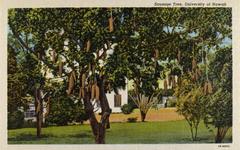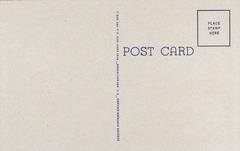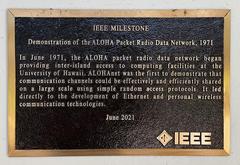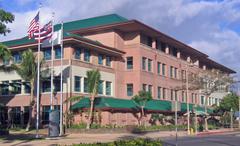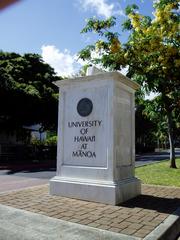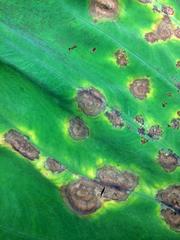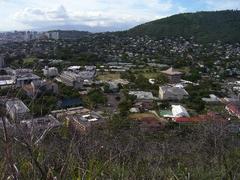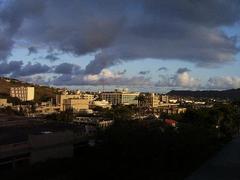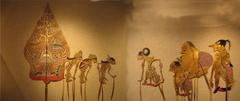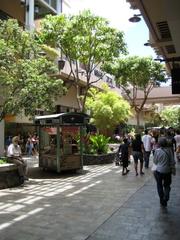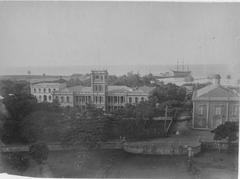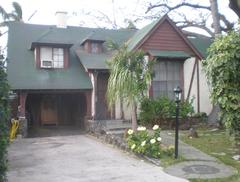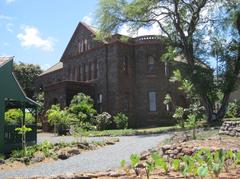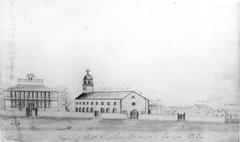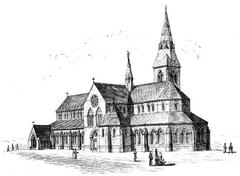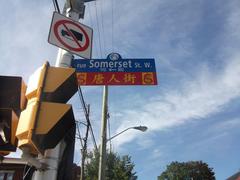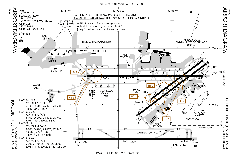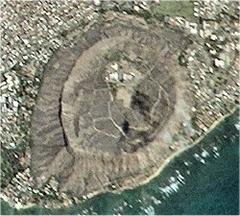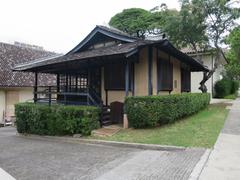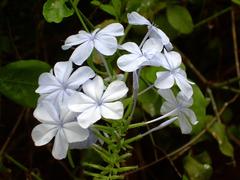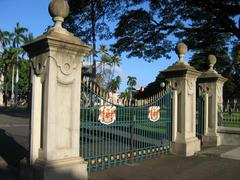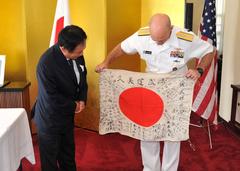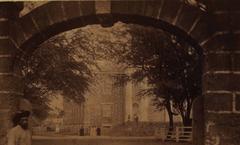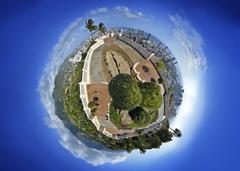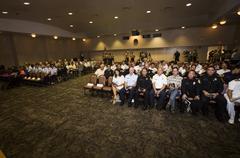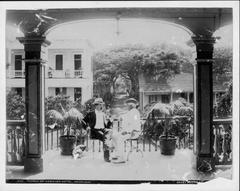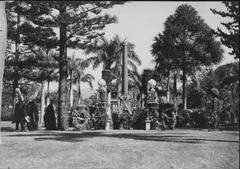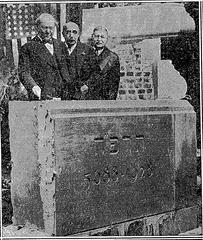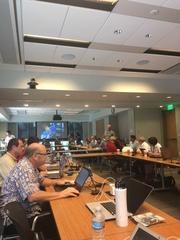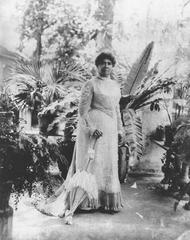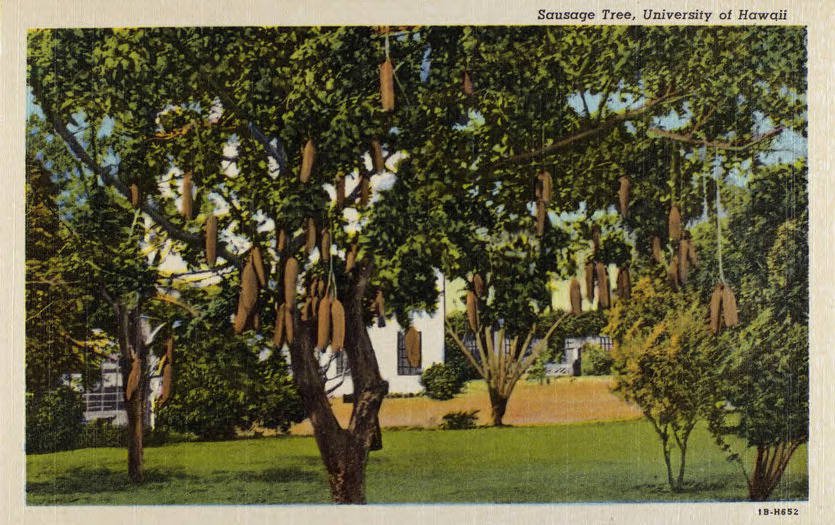
University of Hawaiʻi at Mānoa Visiting Hours, Tickets, and Guide to Honolulu Historical Sites
Date: 14/06/2025
Introduction: UH Mānoa’s Academic and Cultural Legacy
The University of Hawaiʻi at Mānoa (UH Mānoa), nestled in the lush Mānoa Valley of Honolulu, is a distinguished institution that seamlessly blends academic rigor, indigenous Hawaiian knowledge, and the natural beauty of the islands. Since its 1907 founding, UH Mānoa has grown from a small agricultural college into a global research university, holding the rare distinction of land-, sea-, sun-, and space-grant status. Its 320-acre campus features a harmonious mix of historic and Pacific-inspired architecture, vibrant multicultural communities, and deep-rooted connections to Hawaiian heritage.
As a visitor, you can explore significant sites such as the Kamakakūokalani Center for Hawaiian Studies, the expansive Hamilton Library, and scenic spaces like the Lyon Arboretum and Mānoa Falls. The university’s commitment to accessibility, sustainability, and cultural enrichment makes it an inviting destination for all. This guide equips you with practical information on visiting hours, campus tours, accessibility, and nearby attractions, including Honolulu’s most treasured historical sites. For planning tools and up-to-date details, consult the official UH Mānoa visitor page and the Campus Visitor Guide, or explore the university’s history.
Contents
- Introduction to UH Mānoa
- Historical Overview and Academic Distinction
- Visitor Information: Hours, Tours, Accessibility, Parking
- Must-See Spots and Experiences
- Student Life, Events, and Community
- Visitor Services and Amenities
- Nearby Honolulu Historical Sites
- Frequently Asked Questions (FAQs)
- Plan Your Visit and Stay Connected
Iolani Palace: Visiting Hours, Tickets, and Exploring Honolulu’s Historic Monument
Discovering Iolani Palace
Iolani Palace stands as a symbol of Hawaii’s royal heritage and the only royal palace on U.S. soil. Built in 1882 by King Kalākaua, it served as the residence of the Hawaiian monarchy until the kingdom’s overthrow in 1893. Its unique architecture—a blend of American Florentine and Italian Renaissance styles—reflects the merging of Hawaiian and Western influences. Now a National Historic Landmark, the palace preserves royal artifacts and tells the story of Hawaii’s monarchy (Iolani Palace Official Website).
Cultural Importance
Iolani Palace represents the identity and resilience of Native Hawaiians, hosting cultural events, educational programs, and ceremonies that celebrate and perpetuate Hawaiian traditions. Learn about Queen Liliʻuokalani and King Kalākaua, the last reigning monarchs, and experience living history on the palace grounds.
Visiting Information
- Hours: Open Tuesday–Saturday, 9:00 AM–4:00 PM (last admission 3:15 PM). Closed Sundays, Mondays, and major holidays.
- Tickets: $20 (adults), $10 (youth 5–17), free for children under 5 and Hawaiʻi residents with ID. Purchase online or at the ticket office.
Tours and Events
Guided tours, led by knowledgeable docents, enrich your understanding of the palace’s history and artifacts. Special events, including cultural performances and holiday celebrations, are held regularly. Check the official website for schedules.
Accessibility and Travel Tips
- Location: Centrally located in downtown Honolulu, accessible via public transit and nearby parking.
- Accessibility: Wheelchair accessible; accommodations available for visitors with disabilities. Service animals are welcome.
- Photography: Permitted on palace grounds; restrictions apply indoors.
Nearby Attractions
After your visit, explore neighboring sites such as the King Kamehameha Statue, Mission Houses Museum, and the Hawaii State Capitol. The vibrant Chinatown district offers dining and cultural experiences nearby.
University of Hawaiʻi at Mānoa: Essential Visitor Information
Historical Evolution and Academic Distinction
Founding and Growth
UH Mānoa began as the College of Agriculture and Mechanic Arts in 1907, relocating to Mānoa Valley in 1912. By 1920, it had become the University of Hawaiʻi, expanding its academic reach and establishing new colleges (UH History; UH Mānoa History).
Research Excellence
It is one of the few U.S. universities with land-, sea-, sun-, and space-grant designations, excelling in astronomy, oceanography, biomedical research, and genetics (Campus Visitor Guide).
Indigenous Knowledge & Cultural Integration
Home to the Hawaiʻinuiākea School of Hawaiian Knowledge, the Kawaihuelani Center for Hawaiian Language, and Kamakakūokalani Center for Hawaiian Studies, UH Mānoa is dedicated to perpetuating Native Hawaiian language and culture (UH Mānoa Catalog).
Global and Regional Impact
Strategically located in the Pacific, UH Mānoa is a leader in Asian and Pacific studies, international business, and environmental law. The East-West Center strengthens academic and cultural exchanges (UH Mānoa History).
Diversity and Student Life
With students from all 50 states and over 100 countries, UH Mānoa is celebrated for its diversity and inclusivity. The campus hosts numerous cultural festivals, markets, and outdoor activities (Society19).
Sustainability and Innovation
The university is committed to sustainability and innovation, integrating traditional ecological knowledge with advanced research and technology (Honolulu Education).
Plan Your Visit: Hours, Tours, Accessibility, and Transportation
Visiting Hours
- Campus Grounds: Open daily, 7:00 AM–10:00 PM.
- Most Buildings: Monday–Friday, 8:00 AM–5:00 PM.
- Special Facilities: Check individual websites for specific hours.
Campus Tours
- Guided Tours: Book in advance through the Admissions Office. Tours last 60–90 minutes.
- Self-Guided Tours: Download maps online or pick up at the visitor center.
Accessibility
UH Mānoa is fully accessible, with ramps, elevators, and accessible restrooms. The KOKUA Program and Disability Services Office provide additional support (UH Mānoa Catalog).
Parking and Transportation
- Parking: Visitor parking in Lower Campus Parking Structure (Zone 20), $5/day (UH Mānoa parking page).
- Public Transit: TheBus routes 4, 6, and 18 serve campus. Route planning at TheBus official website.
- Bike & Rideshare: Bike paths and rideshare drop-off points are available.
Must-See Spots and Experiences
- Kamakakūokalani Center for Hawaiian Studies: Explore cultural programs and native gardens.
- Hamilton Library: The largest research library in the Pacific—visit for special exhibits (Hamilton Library website).
- Lyon Arboretum: Botanical garden with 5,000+ plant species (Lyon Arboretum website).
- Art Galleries & Kennedy Theatre: Rotating exhibitions and performances (UH Mānoa Arts Calendar).
- Athletics: Attend Rainbow Warriors and Rainbow Wahine games at Stan Sheriff Center or Les Murakami Stadium.
Visitor Services and Amenities
- Dining: Campus Center Food Court, Jamba Juice, Starbucks, and Manoa Gardens offer diverse menus.
- Bookstore: Shop for apparel, gifts, and local products.
- Wi-Fi: Free guest Wi-Fi in major public areas.
- Safety: 24/7 campus security and emergency call boxes.
- Language Support: Services in Hawaiian, Japanese, Korean, Chinese, Tagalog.
Student Life, Events, and Community
With 200+ student clubs, there’s always something happening—cultural festivals, public lectures, art markets, and sporting events. Annual highlights include International Night and the Hawaiian Cultural Festival (UH Mānoa events calendar).
Nearby Historical Sites & City Attractions
- Iolani Palace: Hawaii’s royal residence (Iolani Palace Official Website)
- Bishop Museum: Premier Hawaiian history and culture exhibits (Bishop Museum website)
- Waikīkī Beach, Honolulu Museum of Art, Manoa Falls Trail: All within a short drive or bus ride from campus.
Frequently Asked Questions (FAQs)
Q: What are the visiting hours at UH Mānoa?
A: Campus grounds are open 7:00 AM–10:00 PM daily; most buildings operate 8:00 AM–5:00 PM on weekdays.
Q: Are tickets required for campus tours?
A: Guided tours are free but require advance reservations.
Q: Is the campus wheelchair accessible?
A: Yes, with accessible facilities and parking. Contact Disability Services for specific needs.
Q: Is there an admission fee?
A: No; general campus access is free. Some events or museums may charge admission.
Q: Where can I buy tickets for athletic events?
A: Online via the athletics website or at venue box offices.
Plan Your Visit and Stay Connected
Download the Audiala app for guided tours, maps, and event updates. Follow UH Mānoa on social media for the latest news and happenings. For comprehensive planning resources, visit the official visitor page and the Honolulu tourism website.
Summary
A visit to the University of Hawaiʻi at Mānoa is an immersive journey through academic achievement, indigenous heritage, and the natural beauty of Honolulu. The campus’s proximity to historic sites like Iolani Palace and the Bishop Museum enhances your exploration of Hawaiʻi’s rich past and vibrant present. Whether you’re interested in cultural events, outdoor adventures, or academic distinction, UH Mānoa welcomes you with open arms and accessible resources.
Stay informed by checking official resources for current hours, ticketing, and events, and make the most of your experience with digital tools like the Audiala app. Embrace the blend of tradition and innovation that defines UH Mānoa—a gateway to understanding Hawaiʻi’s unique legacy and its place in the world (UH Mānoa History; Iolani Palace; Bishop Museum).
References and Official Links
- UH History, 2025, University of Hawaiʻi
- UH Mānoa History, 2025, University of Hawaiʻi at Mānoa
- Campus Visitor Guide, 2025
- UH Mānoa Catalog, 2025
- Honolulu Education, 2025
- Iolani Palace Official Website, 2025
- Bishop Museum, 2025
- UH Mānoa Visitor Page, 2025
- Lyon Arboretum, 2025
- UH Mānoa Arts Calendar, 2025
